

Mini organs reveal how the coronavirus ravages the body. Researchers are growing miniature organs in the laboratory to study how the new coronavirus ravages the body.
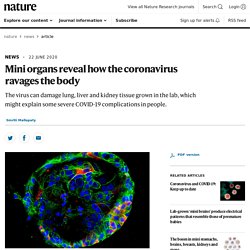
Studies in these organoids are revealing the virus’s versatility at invading organs, from the lungs to the liver, kidneys and gut. Researchers are also experimenting with drugs in these mini tissues to see whether such therapies might be candidates to treat people. Physicians know from hospitalised patients and autopsies that SARS-CoV-2 can have a devastating effect on organs. But it’s unclear whether some of this damage is directly caused by the virus or by secondary complications of the infection. Multiple groups are using organoid studies to show where in the body the virus travels, which cells it infects and what damage it does.
“The beauty of organoids is that they resemble the true morphology of tissues,” says Thomas Efferth, a cell biologist at Johannes Gutenberg University of Mainz, Germany. Researchers Discover New Variant of COVID-19 Virus in Columbus, Ohio. COLUMBUS, Ohio – Scientists at The Ohio State University Wexner Medical Center and College of Medicine have discovered a new variant of SARS-Cov-2, the virus that causes COVID-19.
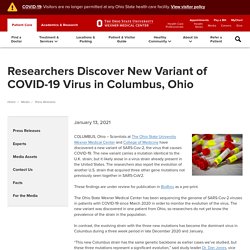
The new variant carries a mutation identical to the U.K. strain, but it likely arose in a virus strain already present in the United States. The researchers also report the evolution of another U.S. strain that acquired three other gene mutations not previously seen together in SARS-CoV2. Pregnancy Outcomes Among Women With and Without Severe Acute Respiratory Syndrome Coronavirus 2 Infection. Key Points Question In a large county health care system with access to inpatient and outpatient testing, is severe acute respiratory syndrome coronavirus 2 (SARS-CoV-2) infection associated with pregnancy outcomes, maternal illness severity, placental pathology, and neonatal infections?
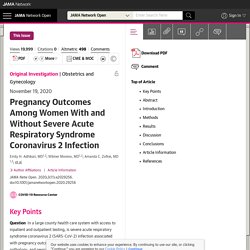
Findings In this cohort study of 252 SARS-CoV-2–positive and 3122 negative pregnant women tested in outpatient and inpatient settings at a large county medical center, adverse pregnancy outcomes were similar, and neonatal infection occurred in 3% of infants, predominantly among infants born to asymptomatic or mildly symptomatic women. Placental abnormalities were not associated with disease severity, and the rate of hospitalization was similar to rates among nonpregnant women. Meaning These findings suggest that SARS-CoV-2 infection in pregnancy is not associated with adverse pregnancy outcomes. Research survey for rare disease patients and their families about impacts of COVID‑19. Skip to main content facebook twitterlinkedin RDCRN Members Login Research survey for rare disease patients and their families about impacts of COVID‑19 Our Survey Is Now Closed The RDCRN research survey for rare disease patients and their families about impacts of COVID‑19 is now closed.
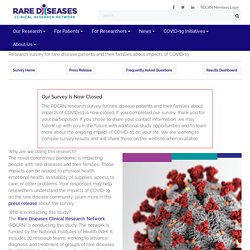
If you completed our survey, thank you for your participation. Why are we doing this research? The novel coronavirus pandemic is impacting people with rare diseases and their families. Who is conducting this study? The Rare Diseases Clinical Research Network (RDCRN) is conducting this study. Who can participate? You qualify for this study if you or someone you care for has been diagnosed with a rare disease, is 0 to 89 years old, and currently lives in the United States.
What conditions are rare diseases? In the United States, a rare disease is defined as a condition that affects fewer than 200,000 people. Update on new SARS-CoV-2 variant and how COG-UK tracks emerging mutations – COG-UK Consortium. Since its creation COG-UK has been supporting genomic surveillance efforts to identify variants of the SARS-CoV-2 virus in the genome sequencing data from the UK.
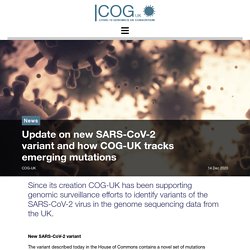
New SARS-CoV-2 variant The variant described today in the House of Commons contains a novel set of mutations associated with a lineage spreading rapidly in the South East of England (and more widely) that is the subject of ongoing investigations by the UK Public Health Agencies, coordinated by Public Health England and supported by COG-UK.
This variant carries a set of mutations including an N501Y mutation in the receptor binding motif of the Spike protein that the virus uses to bind to the human ACE2 receptor. Efforts are under way to confirm whether or not any of these mutations are contributing to increased transmission. How do we collect and sequence SARS-CoV-2 samples? – COG-UK Consortium. As we learn more about COVID-19 disease and how the SARS-CoV-2 virus changes over time, the way we collect and sequence positive SARS-CoV-2 samples will continue to evolve.
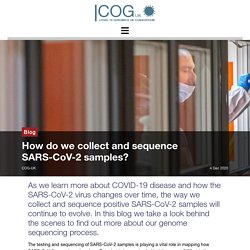
In this blog we take a look behind the scenes to find out more about our genome sequencing process. The testing and sequencing of SARS-CoV-2 samples is playing a vital role in mapping how SARS-CoV-2 spreads and evolves. But what is happening behind the scenes? What is the journey of a positive test swab, and how likely is it that a swab will be genome sequenced? Updates – COG-UK Consortium. Investigative Antibody Completely Inhibits SARS-CoV-2 Infection. MATH+ COVID-19 Hospital Treatment Protocol. The Best Way to Disinfect Masks Without Destroying Them – Smart Air. EVMS Critical Care COVID 19 Protocol. Could My Symptoms Be Covid-19? If you have a symptom that might be Covid-19, doctors say you should isolate until you can be tested.

Most patients will recover on their own within a few weeks. It’s a good idea to monitor oxygen levels at home with a pulse oximeter. Pay close attention to symptoms during days five to 10 of the illness, when oxygen levels may drop to dangerously low levels. Seek medical care at any time if you experience trouble breathing, any concerning symptom or take a turn for the worse. From a sniffle or cough that feels like allergies to severe body aches and crippling fatigue, the symptoms of coronavirus can be unpredictable from head to toe.
Warning of serious brain disorders in people with mild coronavirus symptoms. Doctors may be missing signs of serious and potentially fatal brain disorders triggered by coronavirus, as they emerge in mildly affected or recovering patients, scientists have warned.

Neurologists are on Wednesday publishing details of more than 40 UK Covid-19 patients whose complications ranged from brain inflammation and delirium to nerve damage and stroke. In some cases, the neurological problem was the patient’s first and main symptom. The cases, published in the journal Brain, revealed a rise in a life-threatening condition called acute disseminated encephalomyelitis (Adem), as the first wave of infections swept through Britain. At UCL’s Institute of Neurology, Adem cases rose from one a month before the pandemic to two or three per week in April and May. One woman, who was 59, died of the complication. CDC: One-third of COVID-19 patients who aren't hospitalized have long-term illness. The Centers for Disease Control and Prevention acknowledged Friday that a significant number of COVID-19 patients do not recover quickly, and instead experience ongoing symptoms, such as fatigue and cough.

As many as a third of patients who were never sick enough to be hospitalized are not back to their usual health up to three weeks after their diagnosis, the report found. Full coverage of the coronavirus outbreak "COVID-19 can result in prolonged illness even among persons with milder outpatient illness, including young adults," the report's authors wrote. The acknowledgement is welcome news to patients who call themselves "long-haulers" — suffering from debilitating symptoms weeks and even months after their initial infection. The Science of Hydroxychloroquine – America's Frontline Doctors. Hydroxychloroquine White Paper PDF | Compendium | Real-Time HCQ Studies | U.S.
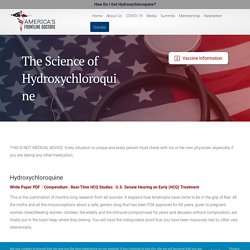
Senate Hearing on Early (HCQ) Treatment This is the culmination of months-long research from all sources. It explains how Americans have come to be in the grip of fear. Hydroxychloroquine FAQs – America's Frontline Doctors. THIS IS NOT MEDICAL ADVICE. Every situation is unique, and every person must check with his or her own physician, especially if you are taking any other medications. It has never happened that the government has restricted physicians from prescribing an FDA approved medication. Hydroxychloroquine (HCQ) has been FDA approved for 65-years. Once a medication is FDA approved it can be prescribed by a physician for any reason. If the medication is prescribed for the specific reason the drug manufacturer requested (e.g. pneumonia) that is called “on-label” use, and if it is prescribed for a different reason (e.g. bladder infection) that is called “off-label” use.
The other reason doctors are always allowed to prescribe off label is because it is desirable for doctors to be able to identify new treatments for new situations. We have also attached a world map which shows how difficult or easy it is to obtain HCQ throughout the world. Azithromycin trial fails to provide evidence of benefit in COVID-19. Early on in the ongoing coronavirus disease 2019 (COVID-19) pandemic, the antibiotic azithromycin was regarded as being a potentially highly effective drug against the virus that causes it, severe acute respiratory syndrome coronavirus 2 (SARS-CoV-2). Hundreds of thousands of doses have been dispensed on this basis to treat these patients. Evidence in support of this hypothesis has been lacking, however. Now, a randomized controlled trial from the UK provides, in its preliminary findings, that it offers no clinical benefit at all, and should be used only for standard indications, that is, if there is any evidence of bacterial infection susceptible to this antibiotic.
The study was published in December 2020 in the preprint server medRvix*. Listen Up. Cookie Consent and Choices. PayView. - The Washington Post. (No) Signs (A) Symptoms COVID-19. Novel Coronavirus Pandemic Proportions.